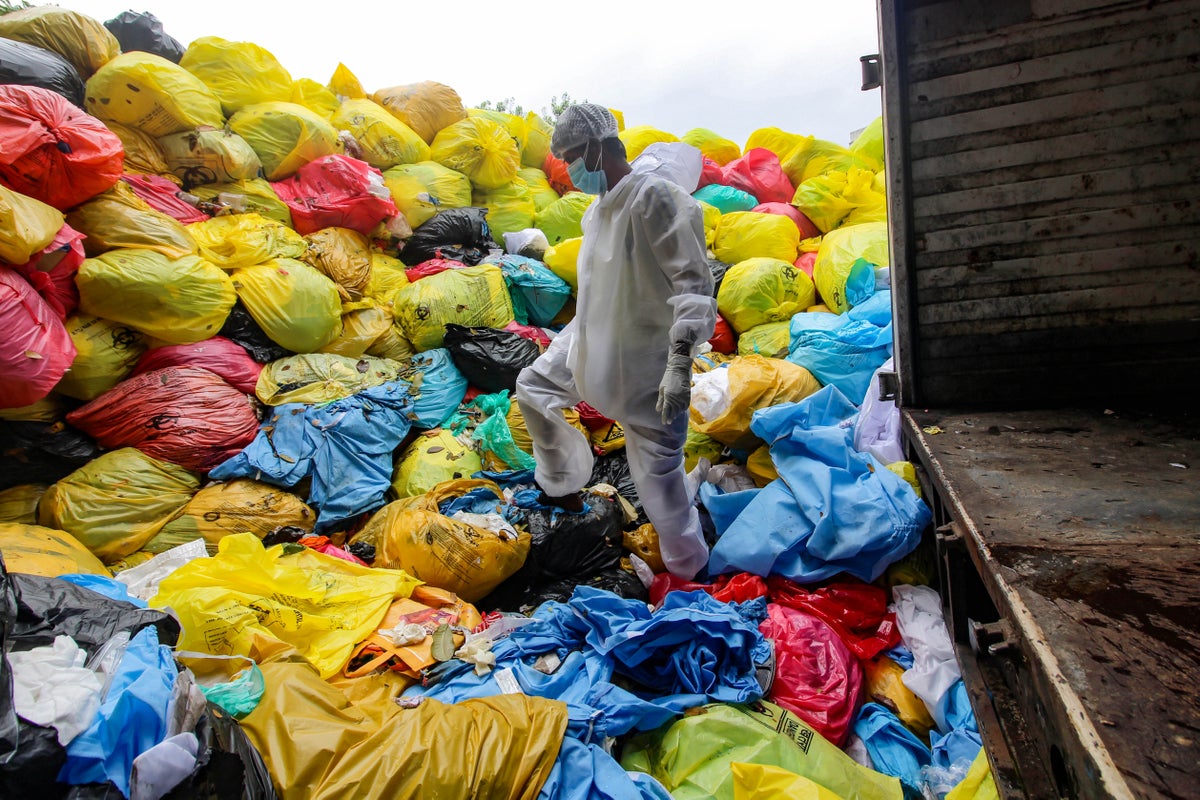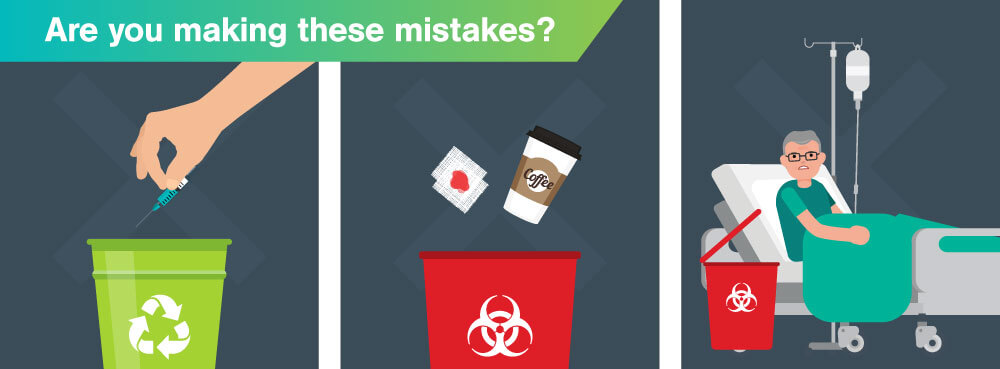The Relevance of Effectively Handling Clinical Waste
Appropriate monitoring of clinical waste is of utmost relevance in healthcare facilities. The handling, storage space, and disposal of medical waste need rigorous adherence to guidelines and policies to ensure the security of people, health care employees, and the setting. Healthcare facilities have lawful and regulatory commitments to correctly take care of clinical waste, and failing to comply can result in penalties and lawful repercussions.
Health And Wellness Threats Related To Improper Waste Management
Incorrect monitoring of clinical waste positions considerable health dangers to both health care employees and the public - WasteX Medical Waste Disposal. Medical waste, which includes sharps, contagious materials, drugs, and contaminated materials, calls for proper handling and disposal to prevent the spread of infections, injuries, and direct exposure to hazardous substances
One of the key wellness dangers related to incorrect clinical waste administration is the transmission of transmittable conditions. Medical care employees that come right into call with infected waste may get conditions such as HIV, liver disease, or various other bloodborne microorganisms. Likewise, if medical waste is not effectively gotten rid of, it can pollute the environment, water sources, and even food, leading to the spread of diseases within the area.
Inappropriate waste monitoring can likewise lead to injuries, particularly from sharps such as needles, scalpels, and broken glass. Unintentional needle punctures can lead to the transmission of bloodborne diseases, while cuts from sharp objects can cause extreme wounds and infections.
In addition, the incorrect disposal of pharmaceutical waste can lead to the contamination of water products. When ended or unused medicines are flushed down the commode or discarded inappropriately, the chemicals can seep into water sources, affecting water life and possibly going into the human food web.
Environmental Influence of Incorrectly Disposed Medical Waste
Among the significant consequences of inadequate administration of clinical waste is its damaging effect on the setting. Poorly disposed medical waste postures a serious hazard to environments, water bodies, and the overall balance of the atmosphere. WasteX Medical Waste Disposal. The dangerous products had in medical waste, such as transmittable agents, pharmaceuticals, and chemicals, can contaminate water, soil, and air, causing extensive air pollution and destruction
When clinical waste is not properly segregated, dealt with, and disposed of, it can find its method right into water bodies via improper landfill methods or illegal disposing. This can lead to the contamination of groundwater and surface water, impacting marine life and possibly contaminating alcohol consumption water resources. The launch of damaging chemicals and pharmaceuticals right into the setting can interfere with communities and injury both pet and plant types.
Additionally, incorrect incineration of clinical waste can release hazardous toxins, consisting of furans and dioxins, right into the ambience. These contaminants have actually been linked to different wellness problems, consisting of respiratory system issues, reproductive conditions, and even cancer cells. The release of greenhouse gases throughout incineration additionally adds to climate change.
To alleviate the environmental impact of poorly disposed medical waste, it is critical to apply appropriate waste management methods. This consists of segregation of waste at the resource, proper treatment methods, and safe disposal strategies. By doing so, we can lessen the air pollution and safeguard the environment from the hazardous effects of medical waste mismanagement.
Regulative and legal Commitments for Health Care Facilities
In order to attend to the environmental effect of poorly disposed medical waste, medical care facilities are needed to follow governing and legal commitments. These commitments are established to ensure the appropriate handling, storage, transport, and disposal of medical waste in a secure and eco accountable fashion.
Among the vital legal responsibilities for healthcare centers is to acquire the required authorizations and licenses for managing clinical waste. This includes acquiring a waste generator recognition number and abiding by federal, state, and neighborhood policies. Medical care centers should additionally maintain comprehensive documents of the types and amounts of clinical waste generated, in addition to the approaches used for its disposal.
In addition, healthcare facilities need to apply correct segregation and packaging procedures for various types of medical waste, such as sharps, contagious waste, and pharmaceutical waste - medical waste disposal service. This consists of using leak-proof containers, biohazard bags, and sharps containers that satisfy regulative criteria
Healthcare centers are also liable for guaranteeing that their team get appropriate training on the appropriate handling and disposal of medical waste. This consists of training on infection control, individual safety equipment, and waste administration procedures.
Best Practices for Safe Handling and Disposal of Medical Waste
To make certain the safe handling and disposal of medical waste, medical care centers need to carry out ideal techniques. These techniques are vital to safeguard the wellness and security of both health care workers and the general public. The appropriate monitoring of clinical waste is important in stopping the spread of contagious conditions and lessening environmental contamination.
One of the very best practices for safe handling and disposal of clinical waste is segregation. Healthcare facilities must separate various kinds of medical waste, such as sharps, transmittable products, and pharmaceutical waste, to stop cross-contamination. Proper labeling and shade coding of waste containers likewise play a crucial function in ensuring the proper segregation of medical waste.
Another essential best technique is the use of ideal basics containers for keeping and transferring clinical waste. These containers should be leak-proof, puncture-resistant, and properly sealed to avoid any type of feasible release of dangerous products. Furthermore, health care centers should develop clear protocols for the collection, storage, and transport of clinical waste to lessen the risk of direct exposure and contamination.
Furthermore, health care facilities have to train their team on the proper handling and disposal of clinical waste. Regular training sessions and correspondence course must be carried out to keep health care employees updated on the most recent standards and policies. This will help make certain that everyone included in the procedure understands the potential threats and is outfitted with the necessary understanding and skills to manage clinical waste securely.
Education and Training for Health Care Professionals in Waste Monitoring
Healthcare experts call for extensive education and training in waste administration to make sure the proper handling and disposal of medical waste. The administration of medical waste is a critical element of medical care procedures as it straight influences the health and wellness of both medical care employees and the public. Correct education and training outfit medical care specialists with the essential expertise and abilities to get rid of and deal with of clinical waste in a eco accountable and risk-free fashion.
Education and training programs for health care experts in waste administration cover a range of topics, consisting of the category and segregation of medical waste, correct packaging and labeling, transport and storage space requirements, and using individual protective tools. These programs likewise stress the value of adherence to regional, nationwide, and international laws and guidelines governing clinical waste monitoring.
By obtaining detailed education and training in waste monitoring, healthcare specialists can effectively lessen the risks connected with medical waste, such as the transmission of transmittable illness and the potential damage to the setting. WasteX Medical Waste Disposal. Well-trained specialists can identify and carry out finest practices that promote sustainability and effective waste monitoring practices within healthcare facilities.
Constant education and learning and training in waste management ought to be a recurring priority for healthcare professionals, as waste management methods and laws may develop in time. By remaining current with the most recent advancements in waste monitoring, medical care professionals can guarantee that they are furnished with the knowledge and abilities essential to make informed decisions and contribute to the overall renovation of waste monitoring techniques in medical care setups.

Final Thought
In final thought, correct administration of clinical waste is important to mitigate health threats and reduce the environmental effect. Health care facilities have regulatory and lawful commitments to make sure safe handling and disposal of clinical waste.

Medical care specialists need detailed education and training in waste administration to guarantee the appropriate handling and disposal of clinical waste - medical waste removal service. The management of medical waste is an essential component of healthcare procedures as it straight impacts the health and wellness and safety and security of both healthcare workers and the basic public